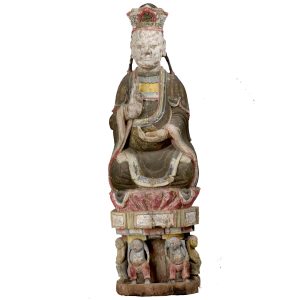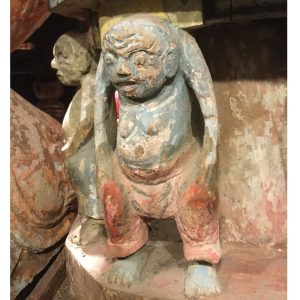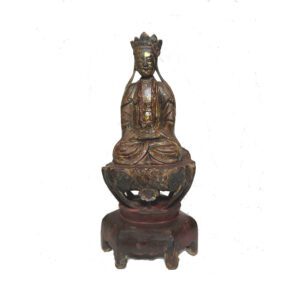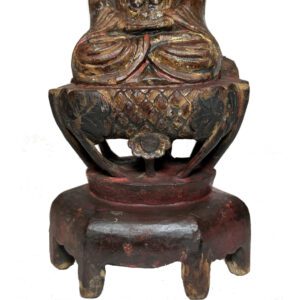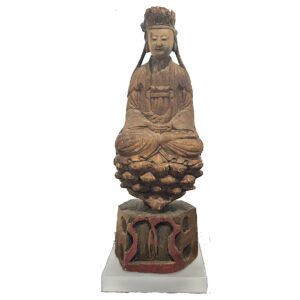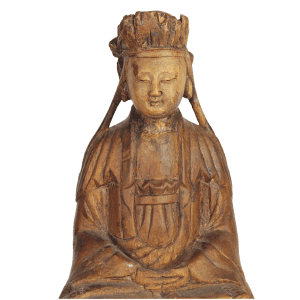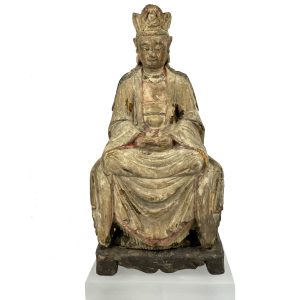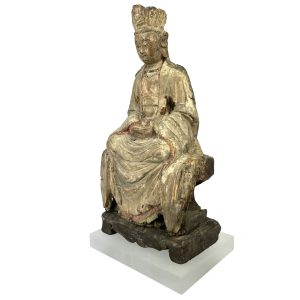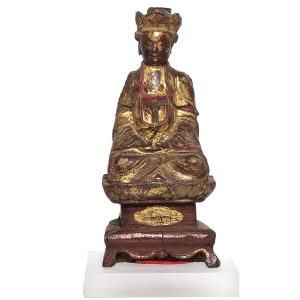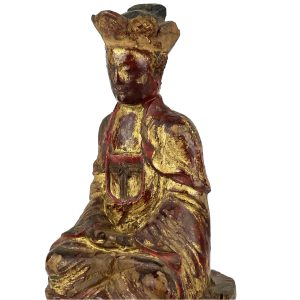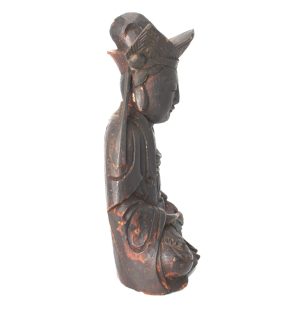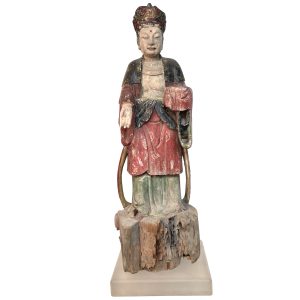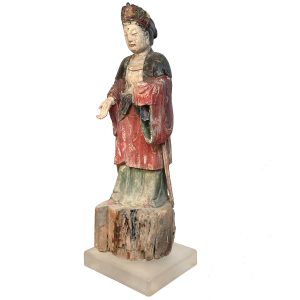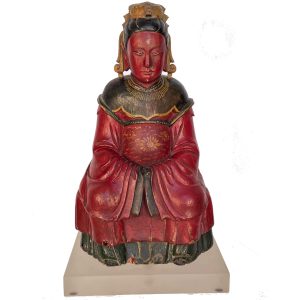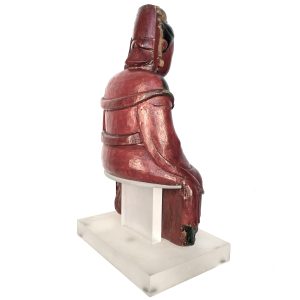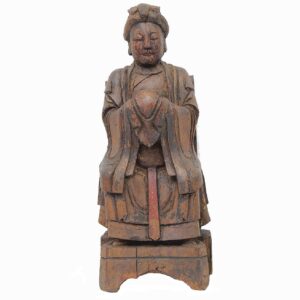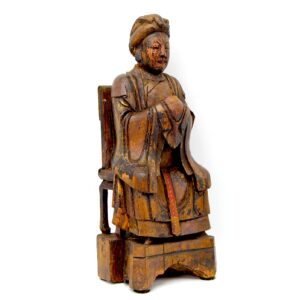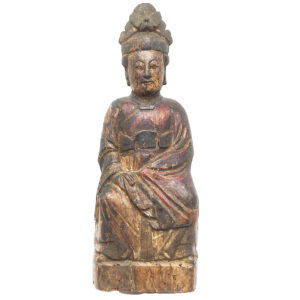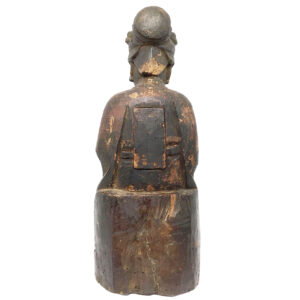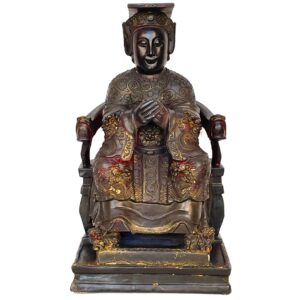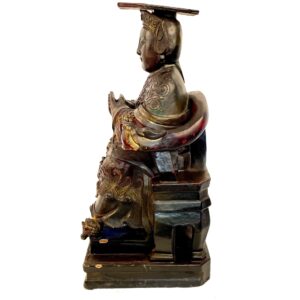Showing 1–12 of 36 results
-
Sale!


$275.00 Original price was: $275.00.$225.00Current price is: $225.00.
Finely carved from dense wood Mazu is the Heavenly Empress on a horseshoe chair, holding official’s girdle, phoenix hat with outstretched wings and cloud collar symbolizing her place in heaven.
-
Sale!


$4,200.00 Original price was: $4,200.00.$3,200.00Current price is: $3,200.00.
H: 45″ W 17.75″ D: 11.5″ | CALL 213-568-3030 OR EMAIL [email protected] FOR SHIPPING
Rare statue of Guanyin held up by 4 creatures in hell remind us that people, like demons, can change and reach enlightenment. Demons are just obstacles – greed, aversion, and ignorance – to overcome through good deeds and thoughts,
-
Sale!


$495.00 Original price was: $495.00.$395.00Current price is: $395.00.
H: 9.5″ W: 4.25″ D: 3.3″ | FREE SHIPPING WITHIN CONTINENTAL U.S.
Guanyin sits on an elaborate lotus throne held by 8 long stemmed and 1 flat leaf lotus as an enlightened being. 5-lobed crown reflects her stature as Buddhist royalty.
-
Sale!


$695.00 Original price was: $695.00.$525.00Current price is: $525.00.
H: 14.5” W: 5.5” D: 4.25” | FREE SHIPPING within continental u.s.
Guanyin’s elegance, compassion and serenity are emphasized in this provincial carving on 3 tiered high lotus throne on a hexagonal base with carved patterns. Portrayed in meditation with flowing robes this consecrated image was designed for personal veneration in a home setting.
-
Sale!


$1,300.00 Original price was: $1,300.00.$975.00Current price is: $975.00.
H: 13.75” W: 7” D: 4.5” | CALL 213-568-3030 or email [email protected] for shipping
Delicately detailed and consecrated Guanyin in meditation on a backless throne, flowing braids, simple necklace, 3-part crown centered with Amitabha Buddha on lotus throne surrounded by a radiating aureole. Compassionate downcast eyes, serene contemplative expression, calm smile to enhance any surrounding.
-
Sale!


$535.00 Original price was: $535.00.$450.00Current price is: $450.00.
Ht: 10.5” W: 5.5” D: 4” | FREE SHIPPING in continental u.s.
Guanyin in lacquer and gilt sits on a lotus throne in meditation atop a decorative footed stand, regally depicted with elegantly draped robes and a 5-lobe crown with a cross hatch design. Consecrated for home altar use.
-
Sale!


$395.00 Original price was: $395.00.$325.00Current price is: $325.00.
H: 8.25″ W: 4.5″ D: 3″ | FREE SHIPPING within continental u.s.
Delicately carved antique Guanyin in meditation, tall 3-lobed crown with flaring triangles and crosshatches. high forehead and oversized head focuses viewer on beautifully formed, quiet and calm face as model of inner serenity
-
Sale!


$1,495.00 Original price was: $1,495.00.$1,330.00Current price is: $1,330.00.
H: 33.5″ W: 33″ D: 10″ | call 213-568-3030 or email [email protected] for shipping
In the Pure Land Buddhist tradition this vibrant provincial Guanyin wears a high crown centered with Amitabha Buddha. Far from imperial influences, this charming carving is a unique eclectic folk art blend of Buddhism, Taoism and Popular Religion. traditions.
-
Sale!


$1,750.00 Original price was: $1,750.00.$1,150.00Current price is: $1,150.00.
H: 21” W: 11.5” D: 8” | FOR SHIPPING call 213-568-3030 or email [email protected]
Temples for “Heavenly Empress” Mazu in southern China coastal regions protect sea faring peoples. This motherly home altar statue reflects that although childless, she protects her children – her devotees – as a mother. Seated on lucite base.
-
Sale!


$425.00 Original price was: $425.00.$225.00Current price is: $225.00.
H: 9” W: 6.525” D: 2.5 | FREE SHIPPING WITHIN CONTINENTAL U.S.
Small consecrated home altar provincial Mazu, finely carved on armless back chair dressed modestly in peasant robes with a phoenix in her hat, she is motherly figure who protects her devotees as her children.
-
Sale!


$395.00 Original price was: $395.00.$315.00Current price is: $315.00.
H: 12.5″ W: 4.8″ | 3.3″ FREE SHIPPING WITHIN CONTINENTAL U.S.
Home altar provincial Queen Mother carving depicted her as approachable, humble and matronly. Iconic phoenix on headdress. Cavity with original sealed covering indicates it was consecrated.
-
Sale!


$1,050.00 Original price was: $1,050.00.$650.00Current price is: $650.00.
H: 15.375” W: 8.625” D: 7.5” | CONTACT US AT 213-568-3030 or email [email protected] for SHIPPING.
Mazu, protector of sea, is portrayed as the imperially sanctioned “Empress of Heaven” on an elaborate, horseshoe shaped dragon throne, holding a hu tablet, with elegant dragon robes, official’s girdle, Empress headdress and small feet on gilt fu lion foot rest.
End of content
End of content



